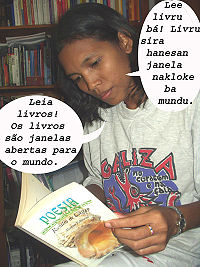
Lusophone
Encyclopedia


Portuguese language
Portuguese is a Romance language that arose in the medieval Kingdom of Galicia, nowadays Galicia and Northern Portugal. The southern part of the Kingdom of Galicia became independent as the County of Portugal in 1095...
, either as a native, as an additional language, or as a learner. As an adjective, it means "Portuguese-speaking". The word itself is derived from the name of the ancient Roman
Ancient Rome
Ancient Rome was a thriving civilization that grew on the Italian Peninsula as early as the 8th century BC. Located along the Mediterranean Sea and centered on the city of Rome, it expanded to one of the largest empires in the ancient world....
province
Roman province
In Ancient Rome, a province was the basic, and, until the Tetrarchy , largest territorial and administrative unit of the empire's territorial possessions outside of Italy...
of Lusitania
Lusitania
Lusitania or Hispania Lusitania was an ancient Roman province including approximately all of modern Portugal south of the Douro river and part of modern Spain . It was named after the Lusitani or Lusitanian people...
, which covered most of the part of the Iberian peninsula
Iberian Peninsula
The Iberian Peninsula , sometimes called Iberia, is located in the extreme southwest of Europe and includes the modern-day sovereign states of Spain, Portugal and Andorra, as well as the British Overseas Territory of Gibraltar...
that is today the Republic of Portugal
Portugal
Portugal , officially the Portuguese Republic is a country situated in southwestern Europe on the Iberian Peninsula. Portugal is the westernmost country of Europe, and is bordered by the Atlantic Ocean to the West and South and by Spain to the North and East. The Atlantic archipelagos of the...
and part of Spain
Spain
Spain , officially the Kingdom of Spain languages]] under the European Charter for Regional or Minority Languages. In each of these, Spain's official name is as follows:;;;;;;), is a country and member state of the European Union located in southwestern Europe on the Iberian Peninsula...
.
The notion of "Lusophonic" reaches beyond the dictionary definition of "Portuguese speaker". It extends to people who are culturally and linguistically linked to Portugal, either historically or by choice. The term does not have an ethnic connotation, in that a Lusophone may not have any Portuguese ancestry at all. The Lusophone world is mainly a legacy of the Portuguese empire
Portuguese Empire
The Portuguese Empire , also known as the Portuguese Overseas Empire or the Portuguese Colonial Empire , was the first global empire in history...
, although Portuguese diaspora communities have also played a role in spreading the Portuguese language and Portuguese culture. Even after the empire's collapse, the corresponding countries continue to exhibit both cultural and political affinities and a broad cultural diversity, expressed in the existence of the Community of Portuguese Speaking Countries, created in 1996.
Lusophone countries include Angola
Angola
Angola, officially the Republic of Angola , is a country in south-central Africa bordered by Namibia on the south, the Democratic Republic of the Congo on the north, and Zambia on the east; its west coast is on the Atlantic Ocean with Luanda as its capital city...
, Brazil
Brazil
Brazil , officially the Federative Republic of Brazil , is the largest country in South America. It is the world's fifth largest country, both by geographical area and by population with over 192 million people...
, Cape Verde
Cape Verde
The Republic of Cape Verde is an island country, spanning an archipelago of 10 islands located in the central Atlantic Ocean, 570 kilometres off the coast of Western Africa...
, East Timor
East Timor
The Democratic Republic of Timor-Leste, commonly known as East Timor , is a state in Southeast Asia. It comprises the eastern half of the island of Timor, the nearby islands of Atauro and Jaco, and Oecusse, an exclave on the northwestern side of the island, within Indonesian West Timor...
, Guinea-Bissau
Guinea-Bissau
The Republic of Guinea-Bissau is a country in West Africa. It is bordered by Senegal to the north, and Guinea to the south and east, with the Atlantic Ocean to its west....
, Mozambique
Mozambique
Mozambique, officially the Republic of Mozambique , is a country in southeastern Africa bordered by the Indian Ocean to the east, Tanzania to the north, Malawi and Zambia to the northwest, Zimbabwe to the west and Swaziland and South Africa to the southwest...
, Portugal
Portugal
Portugal , officially the Portuguese Republic is a country situated in southwestern Europe on the Iberian Peninsula. Portugal is the westernmost country of Europe, and is bordered by the Atlantic Ocean to the West and South and by Spain to the North and East. The Atlantic archipelagos of the...
, São Tomé and Príncipe
São Tomé and Príncipe
São Tomé and Príncipe, officially the Democratic Republic of São Tomé and Príncipe, is a Portuguese-speaking island nation in the Gulf of Guinea, off the western equatorial coast of Central Africa. It consists of two islands: São Tomé and Príncipe, located about apart and about , respectively, off...
, and the Chinese Special Administrative Region (SAR) of Macau
Macau
Macau , also spelled Macao , is, along with Hong Kong, one of the two special administrative regions of the People's Republic of China...
. The Community of Portuguese Language Countries is an international organization consisting of the eight independent countries where Portuguese is an official language. These countries are also referred to as the "Lusosphere".
Diaspora communities in the United States
United States
The United States of America is a federal constitutional republic comprising fifty states and a federal district...
, Canada
Canada
Canada is a North American country consisting of ten provinces and three territories. Located in the northern part of the continent, it extends from the Atlantic Ocean in the east to the Pacific Ocean in the west, and northward into the Arctic Ocean...
, Venezuela
Venezuela
Venezuela , officially called the Bolivarian Republic of Venezuela , is a tropical country on the northern coast of South America. It borders Colombia to the west, Guyana to the east, and Brazil to the south...
, South Africa
South Africa
The Republic of South Africa is a country in southern Africa. Located at the southern tip of Africa, it is divided into nine provinces, with of coastline on the Atlantic and Indian oceans...
and Western Europe
Western Europe
Western Europe is a loose term for the collection of countries in the western most region of the European continents, though this definition is context-dependent and carries cultural and political connotations. One definition describes Western Europe as a geographic entity—the region lying in the...
are also important centers for the Portuguese language, as well as an often hybrid or bilingual Lusophone migrant culture.
See also
- LusitanicLusitanicLusitanic , from Latin Lusitanicus, adjective from Lusitania, the name of a Roman province in the Iberian Peninsula and one of the two official names for Portugal is a term used to categorize persons who share the linguistic and cultural traditions of the Portuguese.When the modern day country of...
- Lusophone musicLusophone musicMusic from Portugal and Portuguese speaking countries is music that comes from Lusitanic countries or that is performed in Portuguese or Portuguese-based creole languages.Generally this term is not used outside of the blogosphere....
- LusophobiaLusophobiaLusophobia is a hostility toward Portugal, a nation occupying the west of the Iberian Peninsula in south-western Europe, its Portuguese people or the Portuguese language and culture. Like Lusitanic, the word derives from Lusitania, the Ancient Roman province that comprised what is nowadays Central...
- LusophiliaLusophiliaLusophilia is the love of, or friendship or sympathy toward, Portugal and/or Portuguese things. The word derives from Luso- plus -philia...
- Geographic distribution of PortugueseGeographic distribution of PortuguesePortuguese is the official and first language of Angola, Brazil, Cape Verde, Guinea-Bissau, Mozambique, Portugal and São Tomé and Príncipe. It is also one of the official languages of East Timor , Macau and the Gabonese-Equatoguinean city of Cocobeach .Uruguay gave Portuguese an equal status to...
External links
- Words Without Borders explores Lusophone literature in translation

